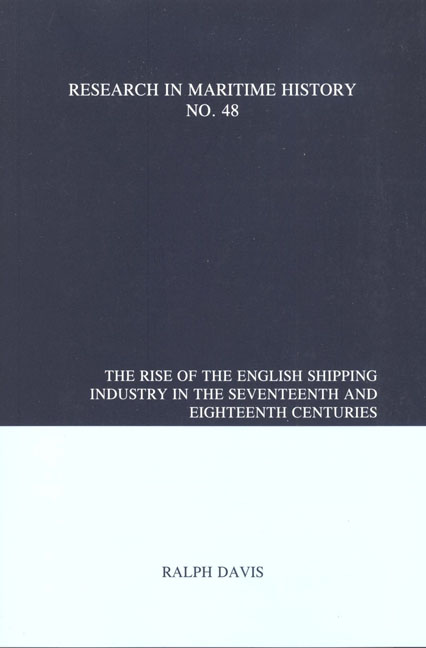Book contents
- Frontmatter
- Contents
- Introduction to the 2012 Edition
- Series Editor's Note
- Introduction
- Preface
- Chapter 1 The Widening of Horizons, 1560-1689
- Chapter 2 Consolidation, 1689-1775
- Chapter 3 Ships and Shipbuilders in the Seventeenth Century
- Chapter 4 Ships and Shipbuilders in the Eighteenth Century
- Chapter 5 The Shipowners
- Chapter 6 The Merchant Seamen
- Chapter 7 The Pay and Conditions of Merchant Seamen
- Chapter 8 Shipping Management and the Role of the Master
- Chapter 9 Shipping and Trade
- Chapter 10 The Nearby and Northern European Trades
- Chapter 11 The Southern European and Mediterranean Trades
- Chapter 12 The East Indian Trade
- Chapter 13 The American and West Indian Trades
- Chapter 14 The Government and the Shipping Industry
- Chapter 15 War and the Shipping Industry
- Chapter 16 Four Ships and Their Fortunes
- Chapter 17 Was It a Profitable Business?
- Chapter 18 Conclusion
- Appendix A A Note on the Shipping Statistics, 1686-1788
- Appendix B Sources for the History of the Shipping Industry
- Index
Introduction
- Frontmatter
- Contents
- Introduction to the 2012 Edition
- Series Editor's Note
- Introduction
- Preface
- Chapter 1 The Widening of Horizons, 1560-1689
- Chapter 2 Consolidation, 1689-1775
- Chapter 3 Ships and Shipbuilders in the Seventeenth Century
- Chapter 4 Ships and Shipbuilders in the Eighteenth Century
- Chapter 5 The Shipowners
- Chapter 6 The Merchant Seamen
- Chapter 7 The Pay and Conditions of Merchant Seamen
- Chapter 8 Shipping Management and the Role of the Master
- Chapter 9 Shipping and Trade
- Chapter 10 The Nearby and Northern European Trades
- Chapter 11 The Southern European and Mediterranean Trades
- Chapter 12 The East Indian Trade
- Chapter 13 The American and West Indian Trades
- Chapter 14 The Government and the Shipping Industry
- Chapter 15 War and the Shipping Industry
- Chapter 16 Four Ships and Their Fortunes
- Chapter 17 Was It a Profitable Business?
- Chapter 18 Conclusion
- Appendix A A Note on the Shipping Statistics, 1686-1788
- Appendix B Sources for the History of the Shipping Industry
- Index
Summary
Nine years after the first publication of this book, it is pleasant to record that later works touching on some of the areas it covered have on the whole confirmed or supplemented, rather than overturned the conclusions that I came to. The most noteworthy new work, because closest to the central interests I had in writing the book, is that on the costs of sea transport, begun independently by Douglass North and issuing in a series of articles by him and his collaborator, Gary Walton. They attempt to quantify the decline in shipping costs with some precision, and come to conclusions similar to my own in attributing it in large degree to improved trading organization and to greater safety from plunderers at sea; though I think they underestimate the part played by technical improvement in ships. W. Salisbury has thrown much new light on the problem of measurement of ships’ tonnage in a series of articles in Mariners Mirror, though I still hold the view that measured tonnage was a concept of only very limited importance to the operator of ships. David Syrett's Shipping and the American War, 1775-83(London, 1970) is a very thorough examination of government employment of merchant shipping in wartime, and reinforces my view that this practice was of considerable value to the shipowner in enabling him to opt out of some wartime risks. A new series of volumes on the history of English ports, the first of which, Francis E. Hyde's Liverpool and the Mersey: An Economic History of a Port, 1700-1970 (Newton Abbot, 1971) appeared recently, promises to fill in this part of the background against which the shipping industry worked.
In this book I elected to deal with the English shipping industry as a service industry that carried goods and people by sea. I therefore ignored the fishery, which is an extractive industry that happens to be carried on at sea. Coastal shipping, on the other hand, was omitted because it was already covered very adequately by two well-known works, J.U. Nefs Rise of the British Coal Industry (London, 1932) and T.S. Willan's The English Coasting Trade, 1600- 1750(Manchester, 1938). And so, notwithstanding the fact that at different times during the period covered by this book between a quarter and a half of the tonnage of English-owned ships was engaged in either fishing or coasting, this book is about ships in overseas trade.
- Type
- Chapter
- Information
- The Rise of the English Shipping Industry in the Seventeenth and Eighteenth Centuries , pp. xxii - xxiiiPublisher: Liverpool University PressPrint publication year: 2012



